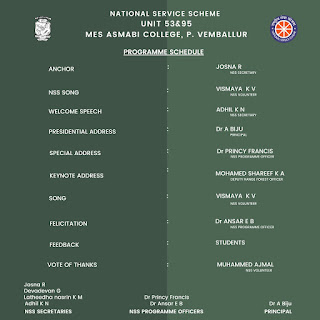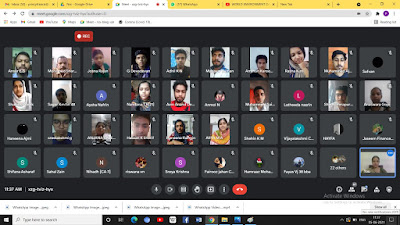Wednesday, September 1, 2021
Monday, August 16, 2021
Sunday, July 18, 2021
Wednesday, June 16, 2021
Monday, June 14, 2021
7_Types of Business Research_Part2
|
Exploratory Research
· Eg, Podcast
curvey research can be used to collect feedback about the podcast consumption
metrics from existing listeners as well as the other podcast listeners who
are not subscribed the particular channel. This helps the author of the
podcast create the more attracted and creative content that will gain a large
audience. · |
|
Descriptive Research
|
|
Causal Research
|
|
Analytical Research
|
|
Theoretical Research
|
|
Conceptual Research
·
|
|
Empirical Research
· Eg, A research
is being conducted to find out if listening to happy music tune while studying
may increase concentration? An experiment is conducted by using a survey among
a set of students who are exposed to happy music tune and another set who are
not listening to any tune and the subjects are then observed. The result
derived from such a research will give empirical evidence if it does promote concentration or not. |
|
Simulation Research •
It involves the creation of an artificial environment which is
very similar to the real environment. •
Thereafter, within this artificial environment the
variables are manipulated and studied. •
Eg, in order to study the consumer’s spending
behaviour, he can be given Rs1,000 and his buying behaviour can be recorded
in an outlet as very similar to an actual retail environment. •
Permits to observe the dynamic behaviour of the
consumer under controlled
conditions. |
|
Quantitative Research
|
|
Qualitative Research
|
6_Types of Business Research_Part1 Basic Research and applied Research
|
Basic Research •
Research for the sake of enhancing knowledge/ developing theories by
discovering generalisation and principles without any intention to apply it
in practice. •
Known as pure or fundamental research •
It is done to develop theories and generalisations. |
|
Applied Research •
Need based research having
high practical relevance. •
The basic aim of such research is to find solutions to the problems
being faced by the society, government or the business •
Since it is specific in nature, is result oriented and is
driven by a clear aim •
Utilizes principles made by fundamental research to
know the problems with best possible manner •
Another form of applied research is action research. The
difference between applied and action research is that the former may be
taken by a researcher to
find the results for a problem being faced by a third party. • However, action researcher has a condition attached that the researcher is also the practitioner. Hence action research is being undertaken by a researcher to improve upon his own practices. |
Problem related to the issue of debentures with redemption
Problem related to the issue of debentures with redemption condition_Part 1
Issue of debentures with redemption condition
19. Theory related to the issue of debentures with redemption condition
Tuesday, June 8, 2021
Issue of debentures for consideration other than cash
12. Treatment related to expenses on the issue of debentures and issue of debentures for consideration other than cash
Monday, June 7, 2021
Issue of Debentures for Cash in Lump-sum
9. Issue of Debentures for Cash in Lump-sum
Video 9: https://youtu.be/lucUf0xZ8fk10. Terms of issue of debentures at par, at premium and at discount
Video 10: https://youtu.be/QFutVIz2Mig
11. Problem 1_Issue of debentures in lump-sum
Video11: https://youtu.be/LzpB3tzCGro
Sunday, June 6, 2021
Session II: Issue of debentures for cash
Session II: Issue of debentures for cash
7. Issue of debenturesVideo 7: https://princyfrancis.blogspot.com/2020/05/issue-of-debenturespart-1.html
8. Journal entries related to debenture issue
Video 8: https://princyfrancis.blogspot.com/2020/05/8-journal-entries-regarding-debenture.html
Saturday, June 5, 2021
Webinar on Ecosystem Restoration related to Environment Day Celebration June 5, 2021 By National Social Service (NSS), MES Asmabi College, P.Vemballur
Wednesday, June 2, 2021
Bond, Distinguish between Fixed Charge and Floating Charge, Charge & Kinds of Debentures
5. Bond, distinguish between fixed charge and floating charge, Charge
Video5: https://youtu.be/FsP7Pqg3MrM6.Kinds of debentures
Video6: https://youtu.be/BRy6kzNmpF8
BRM1: Syllabus discussion
BC5B08 BUSINESS RESEARCH METHODS
Internal: 20 & External: 80
Objectives:
Ø To enable students for acquiring basic knowledge in business
research methods and to develop basic skills in them to conduct survey
researches and case studies.
Business Research: – Definition and significance - Features of business research – The research process – Variable - Proposition - Types of research – Exploratory and causal research –Theoretical and empirical research - Basic and applied research - Descriptive research - Phases of business research – Research Hypothesis – Characteristics – Research in an evolutionary perspective – Role of theory in research - Theory building - Induction and Deduction Theory. (10 Hours, 10 marks)
Module II
Research Design – Definition – Types of research design – Exploratory and causal research design - Descriptive and experimental design – Types of experimental design – Validity of findings –Internal and external validity – Variables in research – Measurement and scaling – Different scales –Construction of instrument - Validity and reliability of instrument(15 Hours, 20 marks)
Module III
Data Collection: - Types of data – Primary Vs secondary data – Methods of primary data collection – Survey Vs observation – Experiments – Construction of questionnaire and instrument – Validation of questionnaire – Sampling plan – Sample size – Sampling methods - Determinants of optimal sample size – Sampling techniques – Probability Vs non probability sampling methods. (15 Hours, 25 marks)
Data Processing: Processing stages - Editing - Coding and data entry – Validity of data – Qualitative Vs quantitative data analysis – Frequency table - Contingency table - Graphs - Measures of central tendency and index number – Testing of Hypothesis - Bivariate and multi variate statistical techniques – Factor analysis – Discriminant analysis- Cluster analysis – Interpretation. (15 Hours, 15 marks)
Research Report: Different types – Contents of report – Need of executive summary – Chapterisation – Contents of chapter - Report writing stages – The role of audience – Readability – Comprehension – Tone – Final proof – Report format – Title of the report – Ethics in research – Subjectivity and objectivity in research. (09 Hours, 10 marks)
















































